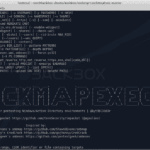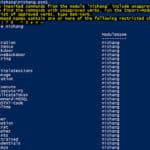CrackMapExec (a.k.a CME) is a post-exploitation tool that helps automate assessing the security of large Active Directory networks. Built with stealth in mind, CME follows the concept of “Living off the Land”: abusing built-in Active Directory features/protocols to achieve its functionality and allowing it to evade most endpoint protection/IDS/IPS solutions. CME makes heavy use of […]
Windows Hacking
nishang – PowerShell For Penetration Testing
Nishang is a framework and collection of scripts and payloads which enables usage of PowerShell for penetration testing, offensive security and red teaming. Nishang is useful during all phases of penetration testing. Usage Import all the scripts in the current PowerShell session (PowerShell v3 onwards).
|
1 |
PS C:\nishang> Import-Module .\nishang.psm1 |
Use the individual scripts with dot sourcing.
|
1 2 3 |
PS C:\nishang> . C:\nishang\Gather\Get-Information.ps1 PS C:\nishang> Get-Information |
To […]
Unicorn – PowerShell Downgrade Attack
Magic Unicorn is a simple tool for using a PowerShell downgrade attack to inject shellcode straight into memory. Based on Matthew Graeber’s PowerShell attacks and the PowerShell bypass technique presented by David Kennedy (TrustedSec) and Josh Kelly at Defcon 18. Usage is simple, just run Magic Unicorn (ensure Metasploit is installed and in the right […]
RWMC – Retrieve Windows Credentials With PowerShell
RWMC is a Windows PowerShell script written as a proof of concept to Retrieve Windows Credentials using only PowerShell and CDB command-line options (Windows Debuggers). It allows to retrieve credentials from Windows 2003 to 2012 and Windows 10 (It was tested on 2003, 2008r2, 2012, 2012r2 and Windows 7 – 32 and 64 bits, Windows […]
windows-privesc-check – Windows Privilege Escalation Scanner
Windows-privesc-check is standalone executable that runs on Windows systems. It tries to find misconfiguration that could allow local unprivileged users to escalate privileges to other users or to access local applications (e.g. databases). Essentially it’s a Windows privilege escalation scanner, the Microsoft side of the World counterpart to unix-privesc-check – which we wrote about a […]



